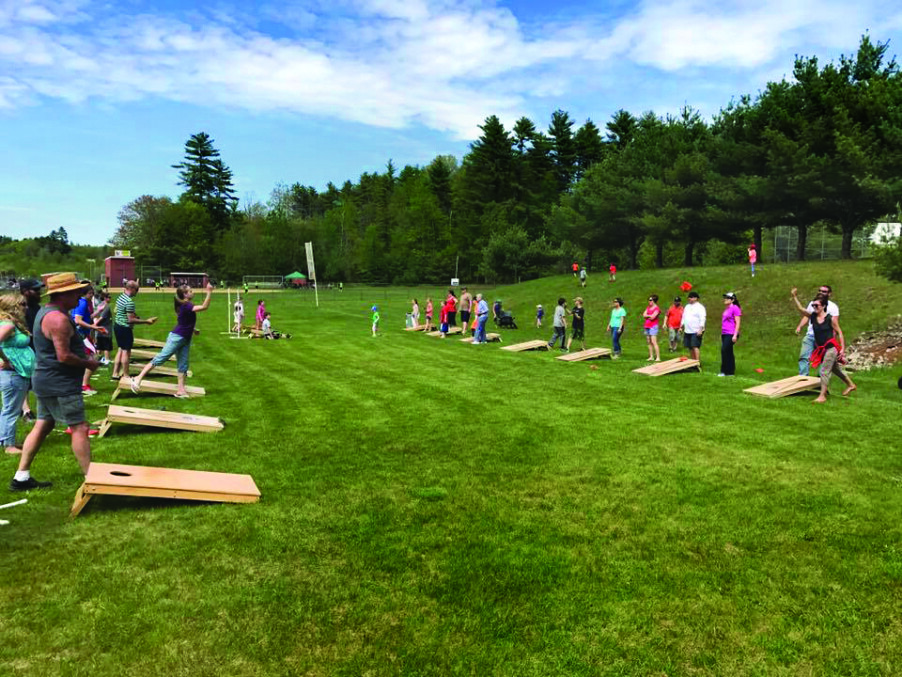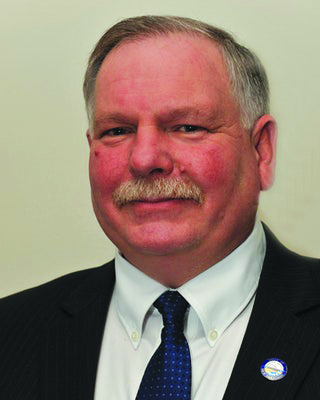When local cornhole enthusiasts Shon Haley and Brian Fletcher started the 603 Cornhole league in 2014, they started it out of necessity; at that time, there were few opportunities for New Hampshire’s small but fervent cornhole community to get together for organized games and events.
“We figured there are leagues for bowling and pool and all that type of stuff,” Haley said, “so why shouldn’t we have a league for cornhole?”
Now, not only does New Hampshire have opportunities to play — it’s a nationwide hotspot for the game. With 78 teams, 603 Cornhole is one of the largest cornhole leagues in the country; Londonderry is home to Game Changer, the country’s only cornhole-specific sports bar; and American Cornhole League Pro Sheila Roy hails from Hooksett.
“I go to events across the country, and I will say that the folks here [in New Hampshire] have so much passion for the game,” Roy said. “That’s not to say people aren’t passionate about it elsewhere, but the people who play here locally love not just the game, but the whole scene of it.”
Phil Parker, a cornhole boardmaker from Deerfield and early member of 603 Cornhole, moved to New Hampshire from Virginia around 13 years ago. Cornhole has always been popular in the South, he said, so its absence in New Hampshire came as a surprise.
“I brought my boards up with me [during the move] and could not find anyone who knew anything about cornhole, so I would just play by myself in my yard,” he said.
Parker said he remembers when the sport really started “taking off” after 603 Cornhole was formed and in the years that followed.
“It grew from [being] just me, Shon [Haley], Brian [Fletcher] and a couple other friends, to six new people the next week, then eight new people, then 20 new people,” he said.
If you still have no idea what cornhole is or how it’s played, here’s the abbreviated version, based on the American Cornhole Association rules: Two teams of two players compete. There are two smooth plywood boards measuring four feet long and two feet wide, with a hole 6 inches in diameter positioned at the far end of the board, which is elevated one foot above the ground so that it sits at a slant. The boards face each other 27 feet apart, with one player from each team standing on either side of each board. From there, players take a series of turns underhand-throwing 6-by-6-inch square bags, traditionally filled with feed corn, at the board across from them. A bag that lands and stays anywhere on the board is worth one point. A bag that is thrown into the hole or pushed into the hole by another bag — theirs or their opponent’s — is worth three points. The first team to reach 21 points wins.
There are a couple different approaches to the game: You could focus all of your energy on getting the bag in the hole and scoring points for your team — and that’s a perfectly valid way to play, Haley said — or you could employ a bit more strategy to try to keep your opponent from scoring points.
“Sometimes it’s better to throw a bag right in front of the hole on purpose,” Haley said. “That tends to make your opponent not throw as good of a throw, or [they] throw their bag over the top [of the board] because they’re trying not to knock your bag in the hole.”
There are a number of cornhole leagues in New Hampshire with different formats. Some are more casual, with games held on an ongoing basis that are open to drop-ins and will even pair single players with a partner. Others, including 603 Cornhole, run more formal seasons and tournaments.
“Pretty much any night of the week, whether you’re a beginner or a more advanced player, you can find something somewhere within New Hampshire involving cornhole,” Haley said.
In May 2020, brothers Bob and Rodney Carrier opened Game Changer, a 6,000-square-foot facility with a bar and eight indoor regulation cornhole courts. The venue is used by organized cornhole leagues and groups for weekly games and tournaments; private parties, charity fundraisers and corporate events; and people just looking to have a fun night out.
“We started playing with some of these [local] cornhole groups, and we realized that they didn’t have any place to play during the winter. They just kind of stopped,” Bob Carrier said. “We saw an opportunity.”
Game Changer was an instant success.
“We didn’t have to build up a clientele or anything; the cornhole community came right in and hit it hard right from the start,” Carrier said. “We had tournaments going every night almost right away.”
The vision for Game Changer, Carrier said, was to create a sports bar that is also a “family-oriented place,” and having cornhole as the focal point has facilitated that atmosphere.
“We don’t get people coming in here to do a bunch of shots,” he said. “We get families with babies; people in their 50s, 60s, 70s; husbands and wives; fathers and sons; mothers and daughters — cornhole brings everyone together because anyone of any age can play.”
Roy can attest to that; she’s 56 and was accepted for her first season as an ACL Pro this year.
“It doesn’t have a barrier like other sports,” she said. “There’s no advantage to being tall or fast or strong or a certain age. It’s a level playing field for everyone, so I always felt like I could do this, and keep competing at a higher and higher level.”
To anyone who is hesitant about playing due to their athletic ability, Roy said don’t be; she had never played or even heard of cornhole until around seven years ago.
“There are folks who just pick it up really quickly, some who would totally surprise you,” she said. “You just can’t know until you throw a bag.”
Meet Phil Parker
Phil Parker is the owner of Kustom Woodz, where he builds custom cornhole boards out of his home wood shop in Deerfield.
Parker became interested in making cornhole boards around 15 years ago while living in Virginia, not long after being introduced to the game. It started as a hobby, making boards for his family and friends. The first board he ever made was one with a Budweiser/Bud Light logo.
“I was basically just taking a piece of plywood and two-by-fours, painting them and putting a sticker on it,” he said. “It has evolved from that into making league-quality boards with the best materials.”
There wasn’t much demand for cornhole boards in New Hampshire, he said, until around four years ago. That’s when he turned his hobby into an official business. He started working with a local print shop using a UV flatbed printer to transfer the custom designs – which can be personal photos, business logos or any other kind of image – onto the boards.
“The technology with UV printing has really taken off, so I jumped on that,” he said. ‘It’s much better having the image printed directly onto the wood itself, as opposed to a sticker, which is going to end up peeling or getting pulled off.”
All Kustom Woodz boards are made to ACL specifications and are sealed in three coats of a water-based polyurethane, giving them a glossy, water-resistant finish. This not only protects the custom image, Parker said, but also ensures that the boards have the surface texture that regulation boards are supposed to have.
“Pretty much all of the cornhole leagues around here order their boards through me,” he said. “If you go to a cornhole tournament, you’re expecting your bag to [move across the board] at a certain speed, according to the ACL specs that you’re used to.”
Parker said he expects to make and sell between 1,000 and 1,200 boards this year, for leagues as well as for individuals and families who want cornhole boards for their personal use.
“You can give me a picture of your son or your daughter, or your dog or your horse, or your boat or your Harley-Davidson, whatever, and we’ll personalize a board for you,” he said. “People like to have that to take camping or put in their yard.”
See “Kustom Woodz” on Facebook or email [email protected].
Leagues and groups
• 603 Cornhole All skill levels are welcome. League seasons are September through November; January through March; and April through June. The cost is $100 per team for a league session. Drop-ins looking to try it out or play a one-night game can usually be accommodated. Non-league games continue in July and August every Thursday. 603 Cornhole also hosts official ACL events. Visit facebook.com/603cornhole.
• Cornstars Cornhole All skill levels are welcome, with opportunities for both social and competitive play. Blind draw/round robin drop-in tournaments are held most Fridays at 7 p.m. at Game Changer Sports Bar and Grill (4 Orchard View Drive, Londonderry), and every Tuesday at 7 p.m. during the summer outdoors at Town Cabin Deli & Pub (285 Old Candia Road, Candia). Bring your own bags. Entry costs $15, $10 for first-timers. Visit facebook.com/cornstarscornhole.
• Franklin Cornhole League All skill levels are welcome. League season starts in the fall; information on the 2021-2022 season TBA. Visit facebook.com/franklincornholeleague.
• Lakes Region Baggerz Cornhole All skill levels are welcome, with social and competitive divisions. Blind draw/round robin games held every Wednesday at 7 p.m. at Lakes Region Casino (1265 Laconia Road, Belmont). Entry costs $15. League games are held on Saturdays. Visit facebook.com/Lakesregionbaggerz.
• Skull It Cornhole All skill levels are welcome. Blind draw/round robin games every Wednesday night at AJ’s Sports Bar & Grill (11 Tracy Lane, Hudson). Players accumulate points, with playoffs held for top players. Entry costs $15. Visit facebook.com/skullitcornhole.
Special events
• Raymond High School students will have a charity Cornhole Tournament for Special Olympics NH and Big Brothers Big Sisters of New Hampshire in the upper fields at Iber Holmes Gove Middle School (1 Stephen K. Batchelder Parkway, Raymond) on Saturday, July 31, with registration at 9 a.m. and the tournament starting at 10 a.m. The cost is $30 for single players and $60 for teams of two. The tournament is open to ages 14 and up. Visit bbbsnh.org.
• Less Leg More Heart will host its first annual Cornhole Tournament on Saturday, Aug. 7, from noon to 6 p.m. at White Birch Brewing (460 Amherst St., Nashua). The cost is $100 for competitive teams and $50 for social teams. Cash prizes will be awarded. Tickets are available on Eventbrite. Visit lesslegmoreheart.com.
• The Bags on the Beach Cornhole Tournament takes place at Hampton Beach on Saturday, Sept. 11, with check-in from 11 to 11:30 a.m., and the first tournament at noon. Signups for a second tournament to be held later that day will be available after the first tournament, estimated to begin around 3 p.m. There will be cash prizes for the top three winning teams. Registration costs $50 per team. Visit seafoodfestivalnh.com/cornhole-tournament.
Anytime play
These venues have open-play cornhole boards and host various cornhole events throughout the year. (Availability and fees may vary depending on demand and when in use for organized events).
• AJ’s Sports Bar & Grill (11 Tracy Lane, Hudson, 718-1102, ajs-sportsbar.com)
• Block Party Social, 51 Zapora Drive, Hooksett, 621-5150, blockpartysocial.com
• Bonfire Country Bar (950 Elm St., Manchester, 217-5600, bonfire.country)
• Game Changer Sports Bar and Grill (4 Orchard View Drive, Londonderry, 216-1396, gamechangersportsbar.com)
• Revolution Taproom & Grill (61 N. Main St., Rochester, 244-3022, revolutiontaproomandgrill.com)
Featured photo: 603 Cornhole hosts a cornhole fundraising event at the fields at Epsom Central School. Courtesy photo.







